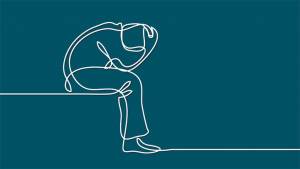Depression:
The underlying physiological cause of depression is still not completely understood but biological, social and psychological factors all play a role in its development. The main hypothesis is that a deficiency in serotonin or noradrenaline neurotransmission in the brain is the main cause and it is on this basis that the clinical activity of anti-depressants is based.
There are many signs and symptoms to look out for that all is not as it should be and these will vary from person-to-person, the most common in depression are:
- Loss of appetite (sometimes overeating)
- Sleeplessness or regular early wakening
- Lack of concentration or easily distracted
- Difficulty in finding enjoyment in everyday events
- Anger or irritability constantly or in bouts
- Anxiety
- Emotional numbness(sometimes described as empty feeling)
- Feelings or thoughts of suicide or self-harm
Most people suffering from depression will suffer some of these symptoms and others may have many of the above.
There are many different types of depression. These include:
- Mild depression: This form of depression is often triggered by a specific event, such as the loss of a job. Symptoms include feeling low and anxious. Sometimes a change in lifestyle is all that is required to lift this kind of depression.
- Severe depression: This could potentially be a life-threatening illness. A person with severe depression experiences intense symptoms, and the illness interferes significantly with their daily life. It is important that medical help is sought.
- Bipolar depression: This is also known as manic-depression or manic-depressive illness. A person with this condition experiences sustained high moods alternating with periods of sustained low moods. High moods can see the person feeling elated and needing less sleep or food than usual. Low moods can range from mild to severe depression.
- Dysthymia: This is a mild form depression, but is more persistent. The condition may come and go, but if it has gone on for more than two months in a two-year time span, dysthymia may be diagnosed. One of the main symptoms is low self-esteem. People with dysthymia are at increased risk of developing full depression.
- Postnatal depression: This is depression which arises after a woman has a baby. It can occur straight after the birth or in some cases, it doesn’t develop until up to a year later. Medical treatment is recommended, however many women do not seek help as they feel that this is something they must endure or they put it down to tiredness or adjustment.
Antidepressant drugs work to restore the imbalance of certain chemicals in the brain, which occurs in depression. There are many different types of antidepressant drugs used to treat depression. They are also used to treat obsessive compulsive disorder, Post traumatic stress disorder, anxiety and neuropathic (nerve) pain including diabetic neuropathy. There have been major improvements over the past 20 years, with newer classes of drugs proving to be very effective with less side effects than the older drugs. Your GP will discuss with you which they think is the most appropriate.
Classes of Antidepressants:
Tri-cyclic Anti depressants:
Lofepramine and Nortriptyline are the most commonly used in this class to treat depression, other molecules such as amitriptyline are rarely used to treat depression anymore due to the risk of toxicity and are more commonly used to treat chronic pain and migraine.
Lofepramine and Nortriptyline work by blocking the re-uptake of the neurotransmitters nor-adrenaline and serotonin. This increases the levels of these chemicals circulating in the brain. Serotonin regulates mood and anxiety and Nor-adrenaline prepares the brain for action and improves energy levels and alertness. These medicines also have anti-muscarinic effects which can cause dry mouth, constipation and drowsiness. These side effects wear off usually over the first couple of weeks of treatment. It take between 4 and 6 weeks for these medicines to work. They are not suitable if you have had a recent heart attack, or if you suffer from glaucoma, heart disease or epilepsy.
Selective serotonin re-uptake inhibitors (SSRI’s:
These are the most commonly prescribed class of anti-depressants examples of these are Fluoxetine, Citalopram, Escitalopram, Paroxetine and Sertraline. Their popularity stems from ease, safety and tolerability. They also have multiple actions beyond their antidepressant action e.g. panic disorder, bulimia and migraine.
They block the re-uptake of Serotonin only, thereby enhancing mood and emotion. SSRI’s commonly cause mild side effects such as nausea, diarrhoea, dizziness, sweating and headache these will usually wear off over time. SSRI’s can take up to 4 to 6 weeks to work fully. They should be used with caution in patients with diabtetes, epilepsy, kidney disease and those on anti-coagulant medication.
Serotonin-Noradrenaline re-uptake inhibitors:
Duloxetine and Venlafaxine are the most common of these in Ireland. They are used to treat many of the same disorders as SSRI’s and are also used commonly to treat neuropathic pain and diabetic neuropathy. The mechanism of action of SNRI’s is similar to that of SSRI’s and Tricyclics but they are dose dependent, At lower doses they act like SSRI’s and as the dose increases to a moderate dosage they then block the re-uptake of Noradrenaline. At dosages close to the maximum they also inhibit the re-uptake of Dopamine causing a mild dopaminergic effect. Dopamine has a broad spectrum of activity being involved in movement, mood, addiction and stress.
Their side effects are dizziness, nausea, dry mouth, constipation, sweating and insomnia. These medicines may not be suitable if you suffer from heart disease or uncontrolled hypertension.
Noradrenaline and specific serotonergic antidepressants:
Mirtazapine is a member of this class of medicines. They have a similar mechanism of action as SSRI’s and cause similar side-effects but tend to cause drowsiness more frequently. They are usually used if a person is intolerant to SSRI’s or where drowsiness is a desirable side-effect.
Other anti-depressants such as Agomelatine are melatinergic agonists resynchronising your body’s natural circadian rhythm and also increasing circulating levels of the neurotransmitters Noradrenaline and Dopamine. It is safe to use in those with cardiac disease and can improve sleep patterns within a week of its initiation. Its side-effects include, nausea, diarrhoea, constipation, dizziness and anxiety.
Please Note:
While these medicines overlap in their mechanism of action they are structurally distinct from each other, if one does not work an alternative may well have a positive effect. These medicines should never be stopped abruptly and doses should always be tapered gradually. An emergency supply can be obtained in certain circumstances from your pharmacist should you inadvertently run out. It is generally recommended to maintain treatment for a minimum of 6 months.
As alcohol has a depressant effect it is always recommended to avoid or minimise alcohol consumption with anti-depressants particularly in the initial 10 weeks of treatment.
There are many alternative types of treatment that can improve your mental well being including acupuncture, Cognitive behavioual therapy, mindfulness and yoga. Research has also shown that becoming physically active and finding an exercise to suit your level of fitness can help improve your mental well being. 150 minutes per week of moderately vigorous exercise is recommended for adults to maintain physical and mental well being e.g fast walking, swimming or jogging.
- Pieta House- call 1800 247247 or text Help to 51444
- Aware- 1800 804848
- Spunout.ie 1800 459459


